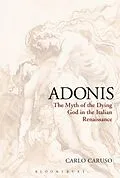In this detailed treatment of the myth of Adonis in post-Classical times, Carlo Caruso provides an overview of the main texts, both literary and scholarly, in Latin and in the vernacular, which secured for the Adonis myth a unique place in the Early Modern revival of Classical mythology. While aiming to provide this general outline of the myth's fortunes in the Early Modern age, the book also addresses three points of primary interest, on which most of the original research included in the work has been conducted. First, the myth's earliest significant revival in the age of Italian Humanism, and particularly in the poetry of the great Latin poet and humanist Giovanni Pontano. Secondly, the diffusion of syncretistic interpretations of the Adonis myth by means of authoritative sixteenth-century mythological encyclopaedias. Thirdly, the allegorical/political use of the Adonis myth in G.B. Marino's (1569-1625) Adone, published in Paris in 1623 to celebrate the Bourbon dynasty and to support their legitimacy with regard to the throne of France.
Autorentext
Carlo Caruso is Professor of Italian Philology at the University of Siena, Italy. For Bloomsbury he has published Adonis: The Myth of the Dying God in the Italian Renaissance (2013), and co-edited with Andrew Laird Italy and the Classical Tradition (2013).
Inhalt
Table of contents:
Preface
Introduction
1. An ancient myth revisited: Adonis as citrus tree
2. Adonis and the Renaissance idyll
3. Adonis in sixteenth-century mythography
4. G.B. Marino's 'Adone' (1): From pastoral to epic poetry
5. G.B. Marino's 'Adone' (2): The king's poem
6. The seventeenth-century aftermath
Bibliography
Index of manuscripts
Index of names
